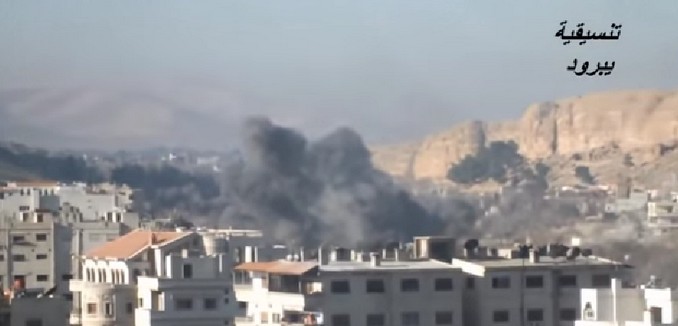A decisive battle is underway in the area of Syria’s northwestern bornder with Lebanon between Syrian rebels and the Lebanese terror organization Hezbollah. Launched a few days ago, this battle is taking place in parallel with other battles by Syrian rebel groups in southern Syria who are trying to topple embattled dictator Bashar al-Assad.
This is one of the most significant advances of rebels in the territories still held by Assad’s forces—an advance that may threaten Assad’s stronghold in Damascus.
Local media are calling the fighting, concentrated in the al-Qalamoun mountains, the “The Spring Battle.” The rebel factions are led by the al-Nusra Front, the Syrian branch of al-Qaeda, which is composed of armed Sunni fighters. The separate Syrian rebel groups finally united recently under one organized body called “Jaysh al-Fatah,” a move that is likely to make it difficult for the Shiites and Alawites allied with Assad.
Strategic importance and implications
The al-Qalamoun campaign is very important for both sides. Thousands of Iran-backed Hezbollah fighters from Lebanon, who are helping to prop up Assad, frame the campaign as an “existential battle” to preserve their hold on the border area and to protect the Lebanon-Damascus supply lines. The area is directly linked to the security of Damascus, since the Syrian government’s supply lines that pass through it are essential for the Assad regime.
Opposition forces have ramped up their attacks recently near Damascus itself, and the forces loyal to Assad find themselves fighting on numerous fronts, having already lost major outposts in northern and southern areas of Syria. The combined attacks in al-Qalamoun and the Damascus suburbs may bring the rebels closer than ever to the center of Assad’s regime. If the rebel operations prove successful, the strongholds of Assad, like those in Latakia and Aleppo, will be in danger. In addition, Hezbollah operatives will have difficulty, in such circumstances, to continue their military support for the Syrian army. This will result in Assad’s Alawite stronghold in northwest Syria being totally cut off from Damascus.
The battle is very important to the opposition for several reasons. Among other things, it could create a land link between Homs and Damascus, continue the momentum of victories against Assad’s forces, and encircle Hezbollah fighters who are reinforcing Assad forces.
Tactics
Both sides have been preparing for the Qalamoun battle since September 2014. Al-Nusra front units in the mountainous region on the border have called on other Sunni Muslim fighters to join the battle. Hezbollah acted similarly, calling on Shiites and Alawites in the nearby areas in Lebanon to join the campaign. According to the newspaper al-Hayat (Arabic link), Hezbollah recently finished transferring armored vehicles and hundreds of its soldiers to the combat zone.
Because the Syrian army is stretched between other fronts, it is not expected to provide much help to Hezbollah, which will likely attempt to drag the Lebanese army into the battle. A situation in which there is no assistance from Assad forces or the Lebanese army might limit Hezbollah operations and prevent the organization from effectively entering into Qalamoun in Syria. In that case they would have to be satisfied with a consolidation of its positions along the Lebanon-Syria border.
On the other hand, the rebels’ strategy in al-Qalamoun is based on the “hit and run” method—a quick attack followd by immediate retreat. The al-Nusra Front has deployed fighters (Arabic link) armed with rockets on mountains peaks and fired anti-tank rockets to the combat zones.
The collaboration between various rebel groups may increase the momentum of their recent winning streak. They are also supported by various countries in the region. In recent weeks, circulated reports suggested that Turkey and Saudi Arabia are working together with various rebel factions towards a foreign involvement on the ground in Syrian in order to finally oust Assad.
While the tide of battle in Syria right now appears to favor the rebels, Jonathan Spyer, director of the Rubin Center, recently observed that “given the greater determination and cohesion the Iranians have shown throughout the region,” the Iran-backed Assad regime is a long way from defeat.
[Photo: Quyet Phan / YouTube ]




